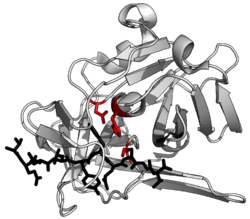
Back Peptidase ALS ببتيداز Arabic Proteaza BS Peptidasa Catalan Proteáza Czech Protease Danish Peptidasen German Πεπτιδάση Greek Proteazo Esperanto Peptidasa Spanish
This article needs additional citations for verification. (December 2024) |

A protease (also called a peptidase, proteinase, or proteolytic enzyme)[1] is an enzyme that catalyzes proteolysis, breaking down proteins into smaller polypeptides or single amino acids, and spurring the formation of new protein products.[2] They do this by cleaving the peptide bonds within proteins by hydrolysis, a reaction where water breaks bonds. Proteases are involved in numerous biological pathways, including digestion of ingested proteins, protein catabolism (breakdown of old proteins),[3][4] and cell signaling.
In the absence of functional accelerants, proteolysis would be very slow, taking hundreds of years.[5] Proteases can be found in all forms of life and viruses. They have independently evolved multiple times, and different classes of protease can perform the same reaction by completely different catalytic mechanisms.
- ^ "Proteolytic enzyme | Description, Types, & Functions | Britannica".
- ^ López-Otín C, Bond JS (November 2008). "Proteases: multifunctional enzymes in life and disease". The Journal of Biological Chemistry. 283 (45): 30433–30437. doi:10.1074/jbc.R800035200. PMC 2576539. PMID 18650443.
- ^ King JV, Liang WG, Scherpelz KP, Schilling AB, Meredith SC, Tang WJ (July 2014). "Molecular basis of substrate recognition and degradation by human presequence protease". Structure. 22 (7): 996–1007. doi:10.1016/j.str.2014.05.003. PMC 4128088. PMID 24931469.
- ^ Shen Y, Joachimiak A, Rosner MR, Tang WJ (October 2006). "Structures of human insulin-degrading enzyme reveal a new substrate recognition mechanism". Nature. 443 (7113): 870–874. Bibcode:2006Natur.443..870S. doi:10.1038/nature05143. PMC 3366509. PMID 17051221.
- ^ Radzicka A, Wolfenden R (July 1996). "Rates of Uncatalyzed Peptide Bond Hydrolysis in Neutral Solution and the Transition State Affinities of Proteases". Journal of the American Chemical Society. 118 (26): 6105–6109. Bibcode:1996JAChS.118.6105R. doi:10.1021/ja954077c.
To assess the relative proficiencies of enzymes that catalyze the hydrolysis of internal and C-terminal peptide bonds [...]
© MMXXIII Rich X Search. We shall prevail. All rights reserved. Rich X Search